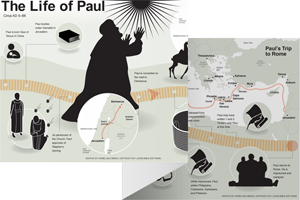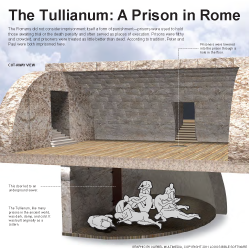The Future of Bible Study Is Here.
Sign in or register for a free account to set your preferred Bible and rate books.
1–7 In the letter to Philemon, Paul writes to persuade Philemon to receive back his runaway slave, Onesimus, as a brother in Christ. Paul is writing to Philemon from prison, although the place and time of this imprisonment is not certain. The most likely options include Ephesus (ad 54–57), Caesarea (ad 58–60), and Rome (early 60s ad). Paul sent this letter along with two others—one to the Colossians, and another (now lost) to the church at Laodicea (Col 4:7–9, 16). After a typical Graeco-Roman greeting (Phlm 1–3), Paul expresses gratitude for Philemon’s faith and love (vv. 4–7).
|
 Paul: A Life of Redemption and Transformation
Paul: A Life of Redemption and Transformation
prisoner Although Paul is imprisoned at this time, he does not regard himself as a prisoner of the state; rather, he is a prisoner of Christ, confined due to his efforts to spread the gospel. Yet even in prison Paul continues his mission (Phil 1:13; 4:22). Compare note on Eph 3:1.
 Desmios, “Prisoner” LRC:P
Desmios, “Prisoner” LRC:P
 Prisons AEHL
Prisons AEHL
 Prison, Prisoner DPL
Prison, Prisoner DPL
 Pauline Self-Designations Table
Pauline Self-Designations Table
Timothy Paul names his associate Timothy as a cosender, although the personal nature of this letter suggests that its content comes primarily from Paul. See note on 2 Cor 1:1.
Philemon The owner of the slave Onesimus and host of the church at Colossae (Phlm 2). Philemon apparently became a believer through Paul’s ministry (v. 19). Although Paul refers to Philemon as a fellow worker, the nature of Philemon’s service is not clear; it does not seem that Paul visited Colossae (Col 2:1), so the two men must have met elsewhere (perhaps Ephesus).
apparently became a believer through Paul’s ministry (v. 19). Although Paul refers to Philemon as a fellow worker, the nature of Philemon’s service is not clear; it does not seem that Paul visited Colossae (Col 2:1), so the two men must have met elsewhere (perhaps Ephesus).
Although this letter does not mention the town of Colossae, Paul’s letter to the Colossians conveys details indicating that Philemon lived there (Col 4:7–9). Colossae was a farming town in southwest Asia Minor (modern-day Turkey), roughly 120 miles east of Ephesus.
 Philemon EDB
Philemon EDB
 Philemon NIEBC
Philemon NIEBC
 Philemon DTIB
Philemon DTIB
fellow worker Paul uses this term to refer to people who served with him in his missionary work (Phlm 24).
2 Apphia our sister Some manuscripts describe Apphia as “our sister,” identifying her as a believer; other manuscripts read “the beloved.” She might be Philemon’s wife, in which case Paul is addressing her because wives often managed household slaves in Graeco-Roman society (compare note on v. 10). Paul is calling on her—as well as Philemon—to receive Onesimus as a brother in Christ.
as “our sister,” identifying her as a believer; other manuscripts read “the beloved.” She might be Philemon’s wife, in which case Paul is addressing her because wives often managed household slaves in Graeco-Roman society (compare note on v. 10). Paul is calling on her—as well as Philemon—to receive Onesimus as a brother in Christ.
 Apphia and Archippus LRC:P
Apphia and Archippus LRC:P
 Apphia NIEBC
Apphia NIEBC
 Apphia AYBD
Apphia AYBD
Archippus Probably another member of Philemon’s household—perhaps his son. Archippus seems to have held some kind of ministry role at Colossae (Col 4:17 and note).
seems to have held some kind of ministry role at Colossae (Col 4:17 and note).
 Archippus NIEBC
Archippus NIEBC
 Archippus AYBD
Archippus AYBD
church in your house Paul addresses the church because the reconciliation he seeks between Philemon and Onesimus will involve the entire community. The early church typically met in homes (Rom 16:5; 1 Cor 16:19; Col 4:15).
 The Church Devotional
The Church Devotional
 Ekklēsia Word Study
Ekklēsia Word Study
3 Grace to you and peace This greeting summarizes Paul’s gospel message (see note on Rom 1:7). If the gospel can reconcile Jew and Gentile (Eph 2:14–16), it also can reconcile slave and master.
5 all the saints The Greek word used here, hagioi, refers to those who have been set apart as God’s people. Paul commended the churches in Ephesus and Colossae for their love for all the saints (Eph 1:15; Col 1:4). He also commends Philemon with the hope that he will extend this same love to his runaway slave, Onesimus, who has become a saint through Paul’s ministry (Phlm 10).
8–21 The body of this short letter conveys Paul’s request for Philemon to welcome back Onesimus as a brother in Christ. Paul bases this appeal partly on his relationship with Onesimus (vv. 19–20), but the primary emphasis is on the bond that Philemon and Onesimus share as believers (vv. 15–16). |
8 order As an apostle, Paul had the authority to command Philemon to receive Onesimus as a brother in the Lord, but he does not take this approach. Paul hopes that Philemon will be motivated by love, not duty (v. 9).
 What Is Required LRC:P
What Is Required LRC:P
9 old man The Greek word here, presbytēs, is used for men between 50 and 56 years old. Paul’s age might explain why he relied on Onesimus’ help.
prisoner of Christ Jesus See note on v. 1.
10 my child Paul considers Onesimus’ to be his spiritual son, suggesting that Paul led him to faith in Christ. Paul also describes Timothy and Titus as his sons (1 Tim 1:2; 2 Tim 1:2; Titus 1:4).
In Graeco-Roman society, slaves did not have legal family members; instead, they were the legal property of their masters.
did not have legal family members; instead, they were the legal property of their masters.
Onesimus Philemon’s runaway slave (see note on Philem 1:16). While he was on the run, Onesimus met Paul and became a believer (the details of their meeting are not mentioned).
Slavery in the ancient Greco-Roman world was different from the form of slavery practiced by Europeans and Americans in the 15th to 19th centuries (compare note on 1 Pet 2:18). People in the first century often sold themselves as slaves to pay debts or climb the social ladder—essentially using slavery as a credit system. Although slavery was not desirable, slaves in the Greco-Roman world could hold positions of authority and even own property. Not all slavery was a permanent situation, and many slaves gained their freedom. Paul consistently tells believers to view slavery within the framework of the gospel: Slaves are to work as if they were serving Christ; masters are to keep in mind that they, too, serve a master—God—and therefore should treat their slaves fairly (Eph 6:5–9; Col 3:22–4:1). In Colossians, which was likely sent with this letter, Paul proclaims that before Christ all people are equal—this would have served as further reason for Philemon to forgive Onesimus’ debt (Col 3:11). A slave’s status did not prevent them from having full dignity in Christ.
Slavery in the First Century
11 he is useful In this verse, Paul makes a several wordplays suggesting that Onesimus—essentially useless without Christ—became truly useful to Paul and Philemon with Christ.
The name Onesimus means “useful” or “profitable”; the Greek word for “useful,” euchrēstos, sounds like the Greek word for “Christ,” christos; and the Greek word for “useless,” achrēstos, sounds like the Greek word achristos, meaning “without Christ.” These wordplays advance Paul’s appeal: Since Onesimus is now part of God’s people, Philemon should treat him primarily as his brother in Christ, not just as his slave.
12 I have sent Paul takes a risk in sending Onesimus back to Philemon. According to Roman law, an owner could severely punish—even execute—a runaway slave (compare note on Phlm 10); anyone who harbored a runaway slave could face charges, as well. Even so, Paul sends Onesimus back to Colossae with Tychicus and this letter (compare Col 4:7–9).
(compare note on Phlm 10); anyone who harbored a runaway slave could face charges, as well. Even so, Paul sends Onesimus back to Colossae with Tychicus and this letter (compare Col 4:7–9).
 Slave, Slavery DPL
Slave, Slavery DPL
 Slavery DNTB
Slavery DNTB
13 on behalf of you Paul wants Philemon to know that Onesimus has helped him and his ministry. In the Greek text of Philemon, Paul’s remark here is worded as if Philemon had sent Onesimus to assist Paul.
14 apart from your consent Paul recognizes that Onesimus’ fate ultimately belongs in Philemon’s hands. For this reason, Paul refrains from keeping Onesimus with him.
not as according to necessity Again, Paul indicates that he wants Philemon’s decision regarding Onesimus to be made freely, not out of obligation (see Phlm 8–9; note on v. 8).
15 a time The time between Onesimus’ escape from Philemon and his return with Tychicus (Col 4:9).
16 more than a slave, a beloved brother This verse expresses the heart of Paul’s request, which is based on his conviction that the gospel of Christ transforms human relationships. Because Philemon and Onesimus have been united with Christ, they both belong to the one family of God; Onesimus the slave has become Philemon’s brother. By embracing Onesimus, Philemon can bear witness to the gospel’s power to transform and reconcile.
brother The Greek word used here, adelphos, often refers in the nt to those who have faith in Jesus Christ; it emphasizes unity and equality over division. In addition to using adelphos here to describe the transformation of Onesimus, Paul uses it twice in reference to Philemon (Phlm 7, 20), putting slave and master on equal terms in accord with the gospel.
17 partner The Greek word used here, koinōnos, indicates that Philemon shares in Paul’s ministry. This partnership is the basis for Paul’s reiteration of his request: Welcome Onesimus as you would welcome me.
18 charge this to my account Acknowledging that Onesimus likely owes a debt to Philemon, Paul takes this obligation upon himself.
 Charge This to Me LRC:P
Charge This to Me LRC:P
 Debt TBD
Debt TBD
19 you owe me even your very self Paul has just volunteered to take over Onesimus’ debt to Philemon; now Paul reminds Philemon of his own indebtedness to Paul. This likely refers to Philemon coming to faith in Christ through Paul’s ministry. Even though Philemon cannot repay this debt, he can refresh Paul’s heart by forgiving Onesimus and, perhaps, sending him back to Paul (see v. 20 and note).
20 benefit The Greek word used here, oninēmi, sounds like “Onesimus.” Through this wordplay, Paul might be asking Philemon to send Onesimus back to him.
 Oninēmi, “To Benefit” LRC:P
Oninēmi, “To Benefit” LRC:P
 Rhetoric DPL
Rhetoric DPL
21 confident of your obedience Paul’s confidence probably comes from his knowledge of Philemon’s character and his commitment to the gospel (vv. 5–7).
22 prepare a guest room for me Although Paul is imprisoned, he aims to visit Philemon after his release.
 Hospitality NBD
Hospitality NBD
23–25 Paul concludes the letter with customary greetings. |
23 Epaphras See note on Col 1:7.
24 Mark, Aristarchus See note on Col 4:10.
Demas, and Luke See note on Col 4:14.
25 The grace of the Lord Jesus Christ Paul’s typical closing in his letters (e.g., Gal 6:18; 1 Thess 5:28).

|
About Faithlife Study BibleFaithlife Study Bible (FSB) is your guide to the ancient world of the Old and New Testaments, with study notes and articles that draw from a wide range of academic research. FSB helps you learn how to think about interpretation methods and issues so that you can gain a deeper understanding of the text. |
| Copyright |
Copyright 2012 Logos Bible Software. |
| Support Info | fsb |
 Loading…
Loading…




